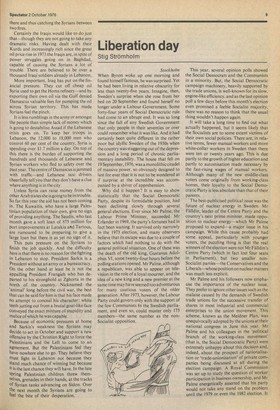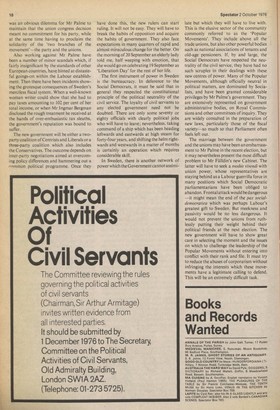Liberation day
Stig Stromholm
Stockholm When Byron woke up one morning and found himself famous, he was surprised. Yet he had been living in relative obscurity for less than twenty-five years. Imagine, then, Sweden's surprise when she rose from her bed on 20 September and found herself no longer under a Labour Government. Some forty-four years of Social Democratic rule had come to an abrupt end. It was so long since the fall of any Swedish Government that only people in their seventies or over could remember what it was like. And it had certainly been quite different in the rather poor but idyllic Sweden of the 1930s when the country was staggering out of the depression and a long period of chronic parliamentary instability. The house that fell on I 9 September, 1976, was a monolithic citadel of massive power, so obviously designed to last for ever that it is not to be wondered at if surprise at the incredible was accompanied by a shiver of apprehension.
Why did it happen ? It is easy to show statistically that the Social Democratic Party, despite its formidable position, had been declining slowly through several general elections. Ever since Mr Palme, the Labour Prime Minister, succeeded Mr Erlander in 1969, the party's fortunes had in fact been waning. It survived only narrowly in the 1973 election, and many observers believe that its escape was due to a couple of factors which had nothing to do with the general political situation. One of these was the death of the old king, Gustavus Adolphus VI, some twenty-four hours before the polling stations opened. Mr Pal me, although a republican, was able to appear on television in the role of a loyal mourner, and the idea of a new king and a new premier at the same time may have seemed too adventurous for many cautious voters of the older generation. After 1973, however, the Labour Party could govern only with the support of the few Communists tn the Swedish parliament, and even so, could muster only 175 members—the same number as the nonSocialist opposition. This year, several opinion polls showed the Social Democrats and the Communists in a minority. But, the Social Democratic campaign machinery, heavily supported by the trade unions, is well-known for its slow, engine-like efficiency, and as the last opinion poll a few days before this month's election even promised a feeble Socialist majority, there was no reason to think that the usual thing wouldn't happen again.
It will take a long time to find out what actually happened, but it seems likely that the Socialists are to some extent victims of their own social policies. There are, in relative terms, fewer manual workers and more white-collar workers in Sweden than there were ten or twenty years ago. This is due partly to the growth of higher education and partly to automisation made necessary by the fast-rising wages of manual workers. Although many of the new middle-class voters come originally from working-class homes, their loyalty to the Social Democratic Party is less absolute than that of their parents.
The best-publicised political issue was the future of nuclear energy in Sweden. Mr Falldin, leader of the Centre Party and the country's next prime minister, made opposition to nuclear energy—which Mr Palme proposed to expand—a major issue in his campaign. While this cause probably had some appeal, particularly with younger voters, the puzzling thing is that the real winners of the election were not Mr Falldin's Centre Party (which in fact lost four seats in Parliament), but two smaller nonSocialist parties—the Conservatives and the Liberals—whose position on nuclear matters was much less explicit.
Mr Palme and his followers now emphasise the importance of the nuclear issue. They prefer to ignore other issues such as the malaise caused by the demands of Swedish trade unions for the successive transfer of shares in most industrial and commercial enterprises to the union movement. This scheme, known as the Meidner Plan, was unequivocally adopted by the unions at their national congress in June this year. Mr Palme and his colleagues in the 'political branch of the working-class movement' (that is, the Social Democratic Party) were extremely unhappy about this decision and, indeed, about the prospect of nationalisation or `trade-unionisation' of private companies being discussed at all during the election campaign. A Royal Commission was set up to study the question of worker participation in business ownership, and Mr Palme energetically asserted that his party would not take any stand on the problem until the 1979 or even the 1982 election. It was an obvious dilemma for Mr Palme to maintain that the union congress decision meant no commitment for his party, while at the same time having to proclaim the solidarity of the 'two branches of the movement'--the party and the unions.
Also working against Mr Palme have been a number of minor scandals which, if fairly insignificant by the standards of other European countries, have hinted at distasteful goings-on within the Labour establishment. Then there have been incidents showing the grotesque consequences of Sweden's merciless fiscal system. When a well-known woman writer could show that she had to pay taxes amounting to 102 per cent of her total income, or when Mr Ingmar Bergman disclosed the rough treatment he received at the hands of over-enthusiastic tax sleuths, the government's reputation was bound to suffer.
The new government will be either a twoparty coalit ion of Centrists and Liberals or a three-party coalition which also includes the Conservatives. The outcome depends on inter-party negotiations aimed at overcoming policy differences and hammering out a common political programme. Once they have done this, the new rulers can start ruling. It will not be easy. They will have to break the habits of opposition and acquire the habits of government. They also face expectations in many quarters of rapid and almost miraculous change for the better. On the morning of 20 September an elderly lady told me, half weeping with emotion, that she would go on celebrating 19 September as 'Liberation Day' for the rest of her life.
The first instrument of power in Sweden is the bureaucracy. In deference to the Social Democrats, it must be said that in general they respected the constitutional principle of the political neutrality of the civil service. The loyalty of civil servants to any elected government need not be doubted. There are only some seventy or eighty officials with clearly political jobs who will have to leave; nevertheless, taking command of a ship which has been heading leftwards and eastwards at high steam for forty-four years, and shifting the helm rightwards and westwards in a matter of months is certainly an operation which requires considerable skill.
In Sweden, there is another network of power which the Government cannot assimi late but which they will have to live with. This is the elusive sector of the community commonly referred to as the 'Popular Movements'. They include above all the trade unions, but also other powerful bodies such as national associations of tenants and old-age pensioners. If, by and large, the Social Democrats have respected the neutrality of the civil service, they have had no such scruples in their dealings with these new centres of power. Many of the Popular Movements, although officially neutral in political matters, are dominated by Socialists, and have been granted considerable privileges by Mr Palme's government. They are extensively represented on government administrative bodies, on Royal Commissions and other committees of inquiry. They are widely consulted in the preparation of new laws, particularly those of the fiscal variety—so much so that Parliament often feels left out.
The marriage between the government and the unions may have been an embarrassment to Mr Palme in the recent election, but it may nevertheless present the most difficult problem to Mr Falldin's new Cabinet. The latter will have to seek a modus vivendi with union power, whose representatives are staying behind as a Labour guerrilla force in many positions which Social Democratic parliamentarians have been obliged to abandon. Frontal attack would be dangerous it might mean the end of the pax socialdemocratic-a which was perhaps Labour's greatest gift to Sweden. But meekness and passivity would be no less dangerous. It would not prevent the unions from ruthlessly putting their weight behind their political friends at the next election. The new government will have to show great care in selecting the moment and the issues on which to challenge the leadership of the Popular Movements without entering into conflict with their rank and file. It must try to reduce the abuses of corporatism without infringing the interests which these movements have a legitimate calling to defend. This will be an extremely difficult task.



































 Previous page
Previous page